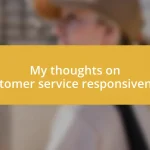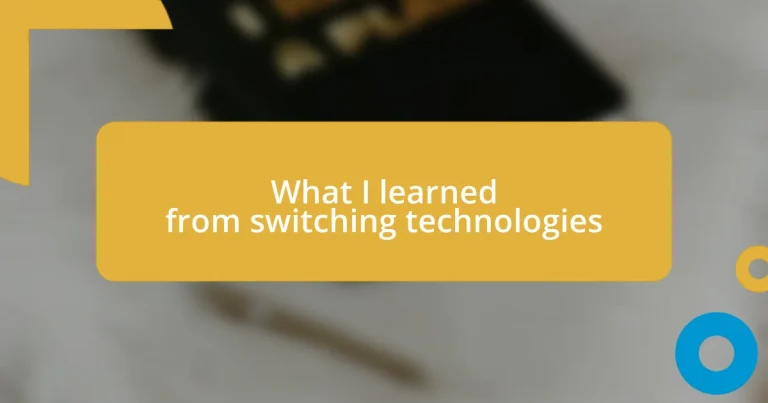Key takeaways:
- The realization that outdated technology was hindering productivity led to a significant transition towards more efficient tools.
- Key technologies adopted included cloud storage, project management software, and video conferencing tools, which enhanced collaboration and creativity.
- Emphasizing adaptability, continuous learning, and networking became essential for personal and professional growth during and after the technology switch.
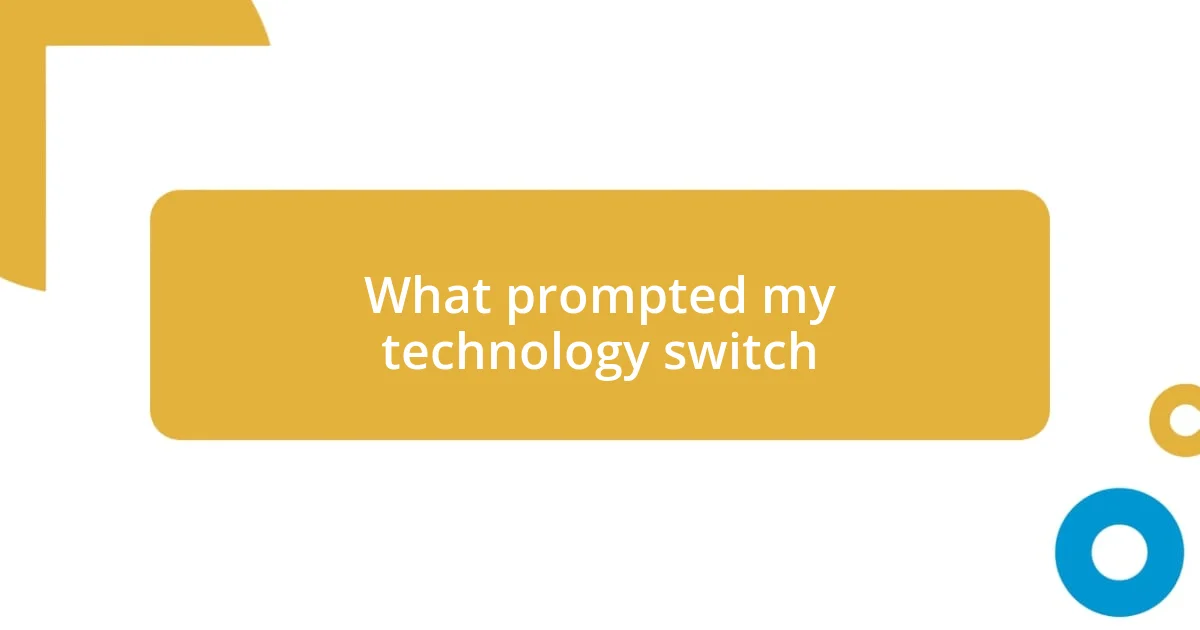
What prompted my technology switch
When I first realized that my old tech was holding me back, it felt like a wake-up call. I remember struggling through a slow program during an important project, the ticking clock echoing my rising frustration. How often have we all been there, waiting for a device to catch up with our creative flow?
The tipping point came one evening when I missed a deadline because my computer crashed yet again. I felt a mix of disappointment and anger, not just at the technology but at myself for putting up with it for so long. Isn’t it wild how we sometimes cling to familiar tools, even when they fail to serve us?
Ultimately, the desire for efficiency and creativity in my work pushed me to explore newer technologies. Each demo and new feature I discovered sparked a curiosity that was invigorating. It made me wonder—what possibilities had I been missing while stuck in my comfort zone?
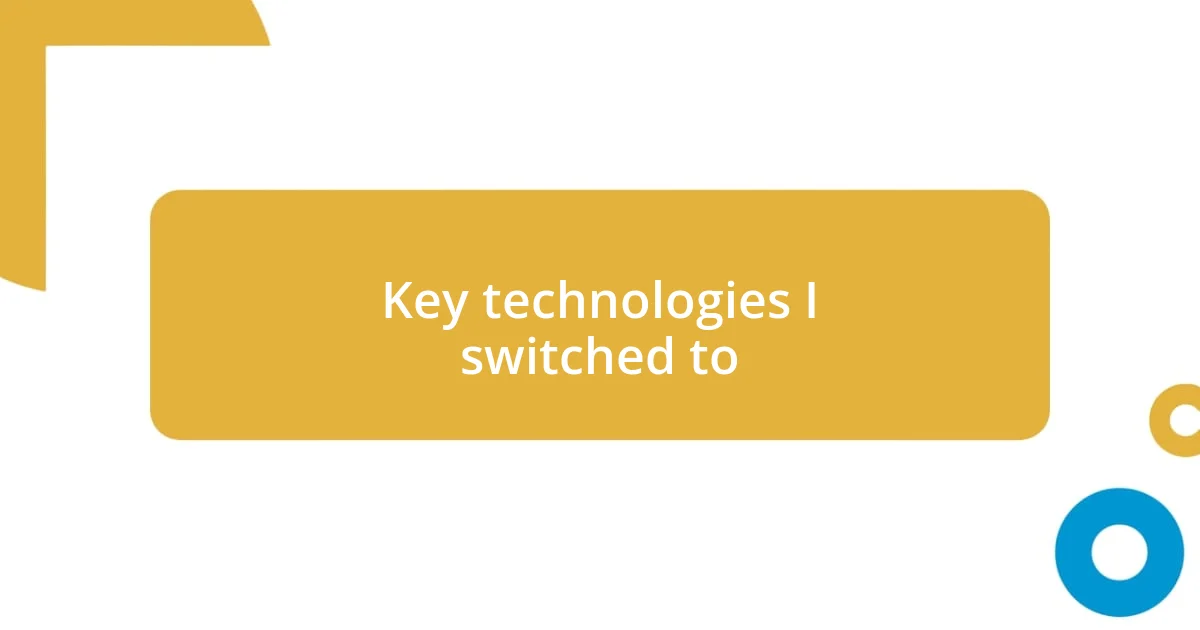
Key technologies I switched to
Switching technologies has been a transformative journey for me, opening doors to enhanced productivity and creativity. I still vividly recall the first moment I adopted cloud-based collaboration tools. Suddenly, I could work seamlessly with my team, sharing documents in real-time, and eliminating those tiresome email chains that seemed to dominate my day. It felt liberating to know that I could easily access my work from anywhere, breaking free from the confines of my desk.
Here are some key technologies I switched to:
- Cloud Storage Solutions: Moved from local storage to Google Drive for instant access and sharing.
- Project Management Software: Transitioned to Trello, which visually organizes tasks and boosts team collaboration.
- Video Conferencing Tools: Shifted from phone calls to Zoom, facilitating clearer communication and engagement.
- Time Management Apps: Adopted Todoist, helping me prioritize tasks effectively and manage deadlines better.
- Graphic Design Software: Switched from Adobe Photoshop to Canva, which simplified the design process without sacrificing quality.
Each of these technologies not only simplified my workflow but also enriched my professional interactions, allowing me to regain control over my time and creativity. The emotional relief I felt when I could finally trust my tools to keep pace with my ambitions was profound, making the transition worth every bit of effort.
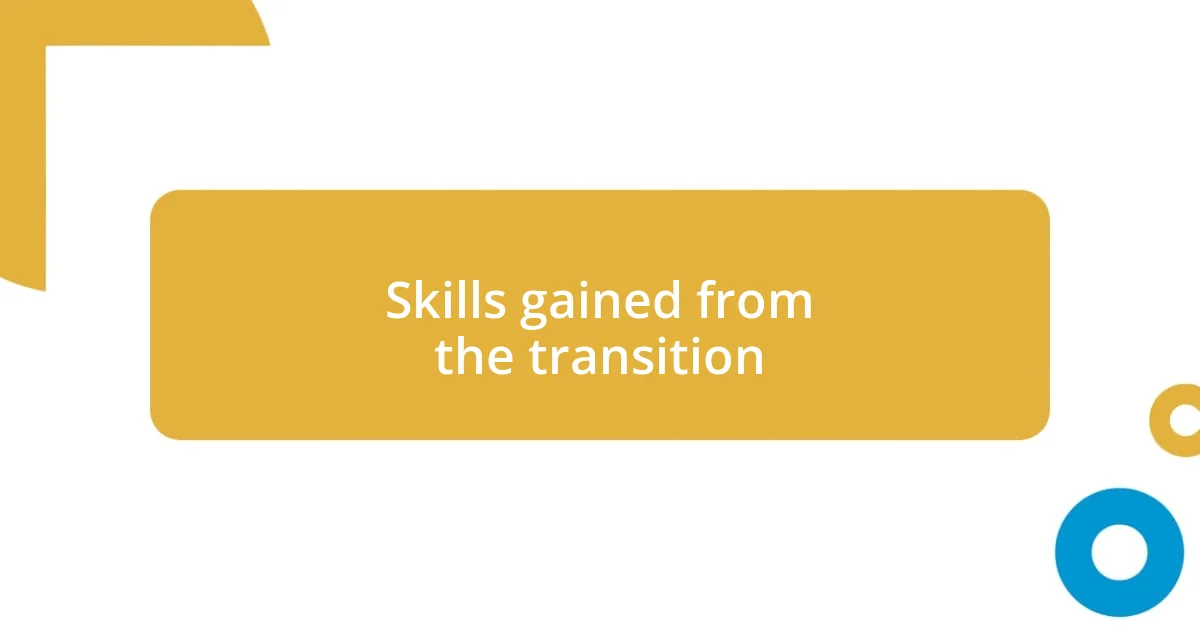
Skills gained from the transition
Switching technologies really sharpened my skills in adaptability and problem-solving. When I first encountered a glitch in my new project management software, I felt overwhelmed. Instead of reverting to old habits, I took a step back and analyzed the problem, eventually discovering a workaround that not only solved my issue but also enhanced my team’s efficiency. This issue pushed me out of my comfort zone and taught me to approach challenges with curiosity instead of frustration.
As I delved deeper into these new tools, I found my communication skills dramatically improving. In video calls using Zoom, I learned to articulate my thoughts clearly and effectively, ensuring that every team member was on the same page. Surprisingly, I even started embracing feedback with much less hesitation, fueled by the collaborative environment of my new software ecosystems. It was an eye-opener, realizing how much I had grown simply by engaging with technology in a different way.
Moreover, I gained a deeper appreciation for data-driven decision-making. With cloud storage and project tracking software, I could analyze our workflows’ productivity metrics. By looking at the data, I became savvy at identifying bottlenecks that previously went unnoticed. This analytical skill didn’t just enhance my work quality but opened my eyes to the importance of using metrics to inform my decisions, a lesson that proves invaluable in any field.
| Skill | Previous Level | Current Level |
|---|---|---|
| Adaptability | Moderate | High |
| Communication Skills | Basic | Advanced |
| Data Analysis | Minimal | Proficient |
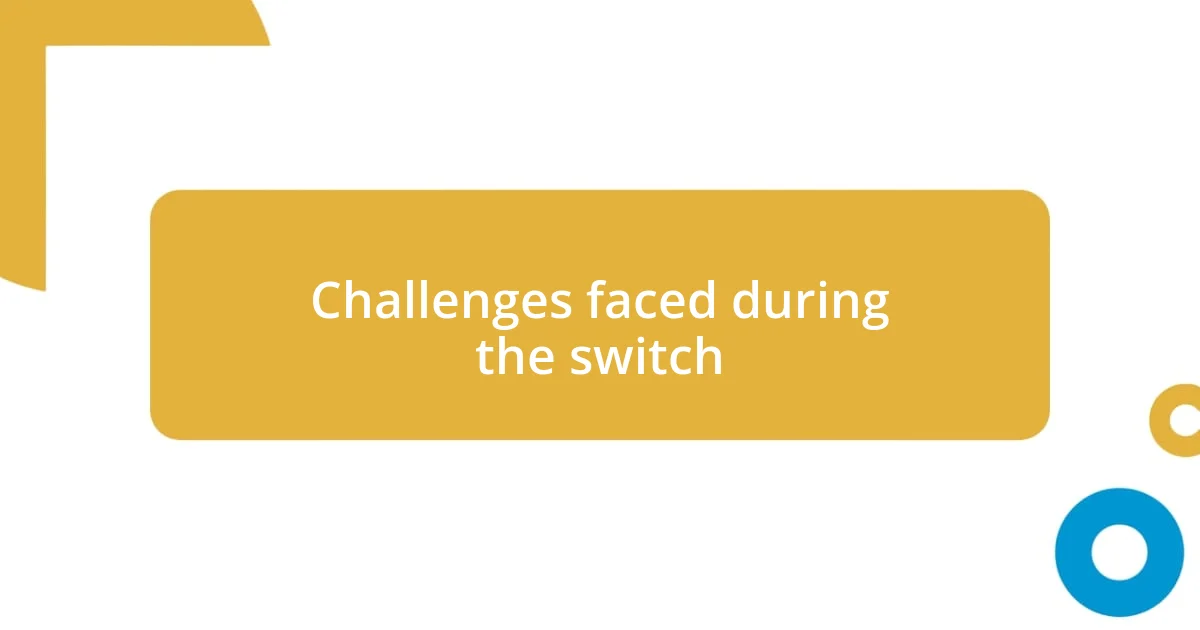
Challenges faced during the switch
Switching technologies wasn’t without its hurdles. Initially, I faced the overwhelming task of learning new interfaces. I remember staring at my screen, feeling a knot in my stomach as I tried to navigate Trello for the first time. It was frustrating! But I soon realized that every challenge was an opportunity for growth.
Then there were the moments when the tools didn’t work as expected. There was one particularly chaotic day when our Zoom meeting was disrupted by connection issues. I felt a wave of anxiety wash over me, fearing we wouldn’t be able to collaborate effectively. It taught me the importance of being prepared with backup plans and staying calm under pressure.
Finally, I encountered the challenge of team buy-in. Not everyone was as excited about these tools as I was. I had to engage my colleagues, showing them the benefits and addressing their skepticism. It made me wonder: how do we encourage others to embrace change? By sharing my experiences and demonstrating the tangible advantages, we gradually created a collaborative atmosphere where everyone felt comfortable exploring the new technology together.
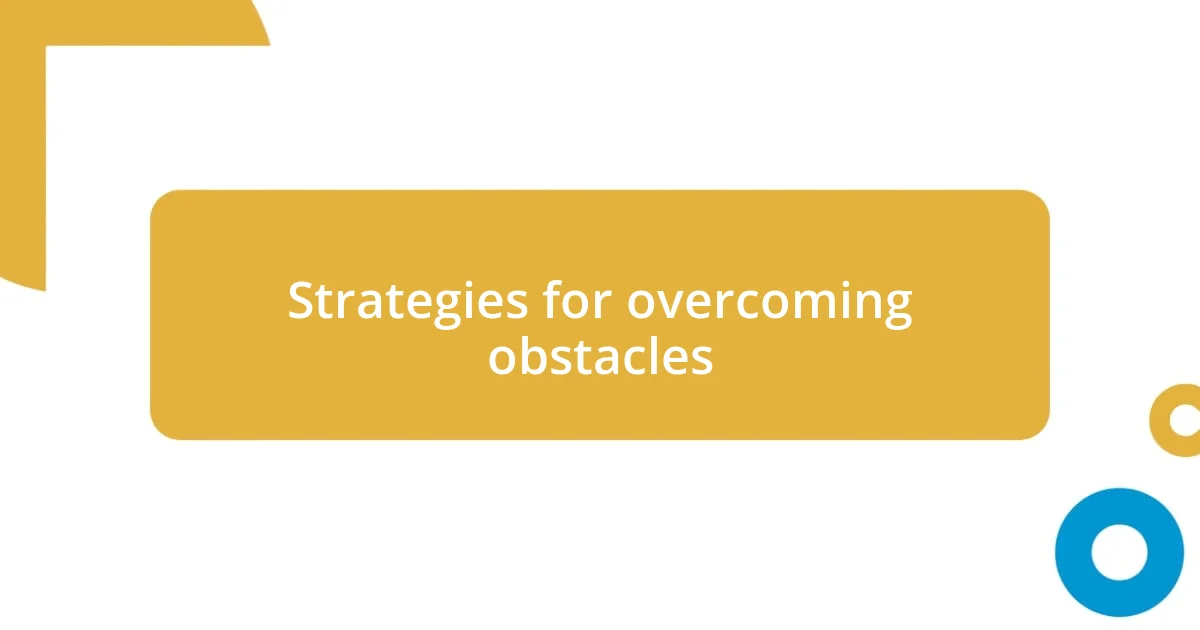
Strategies for overcoming obstacles
One effective strategy for overcoming obstacles during a technology transition is to create a structured learning plan. I remember feeling thrown into the deep end while tackling the intricacies of our new CRM system. To combat this, I dedicated time each week to focus on specific features, turning the overwhelming task into manageable chunks. This approach not only bolstered my confidence but also transformed my initial frustration into a sense of accomplishment.
Additionally, fostering a supportive team environment can significantly smoothen the transition. There were times when I felt lost, especially when collaborating with colleagues who were also learning the ropes. I initiated casual check-in sessions where we could share our struggles and tips. This camaraderie created a positive feedback loop; as we shared insights, I recognized that everyone was learning—and thriving—together in this tech journey.
Lastly, embracing a growth mindset is vital. When a process didn’t go as planned, I’d often pause to reflect on what I could learn from the experience rather than fixating on the failure itself. I vividly recall one project where our software crashed right before a crucial deadline. Instead of panicking, I gathered my thoughts and communicated what we could do next. It was in that moment of adversity that I truly understood: every setback is simply a stepping stone toward greater mastery. Isn’t it fascinating how challenges can become the very catalysts for our growth?
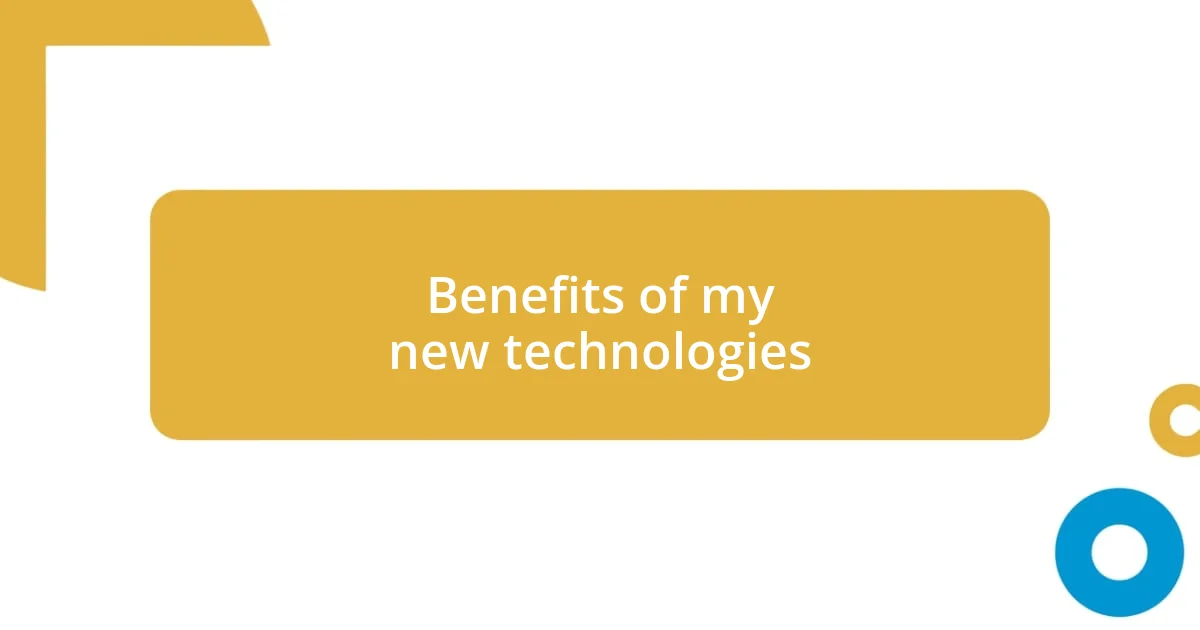
Benefits of my new technologies
Switching to new technologies has been a game changer for me. One clear benefit has been the enhanced efficiency in my daily tasks. For example, I remember the first time I used automation tools to streamline email responses. What used to take hours of sorting through messages now happens in minutes. It felt like I had been given back precious time, allowing me to focus on more meaningful work. Doesn’t it feel incredible when technology liberates your schedule?
I also discovered a significant boost in collaboration among my team. With tools like Slack and shared project boards, communication became clearer and more immediate. I recall organizing a brainstorming session on a new project, where ideas flowed effortlessly through real-time chat. The excitement in those exchanges really energized our group. We built off each other’s thoughts in a way that felt natural and spontaneous—exactly how teamwork should be! Have you ever experienced that moment when synergy clicks? It’s downright invigorating.
Moreover, the learning curve that initially seemed daunting transformed into a source of empowerment. As I navigated through these new systems, I found myself discovering strengths I didn’t know I had. I vividly remember the thrill of mastering a complex feature that had once intimidated me. By delving deep and pushing through uncertainty, I’ve not only improved my tech skills but also built a foundation of resilience. Isn’t it amazing how these experiences can reshape our confidence? Embracing new technologies has truly enriched my professional journey in ways I couldn’t have anticipated.
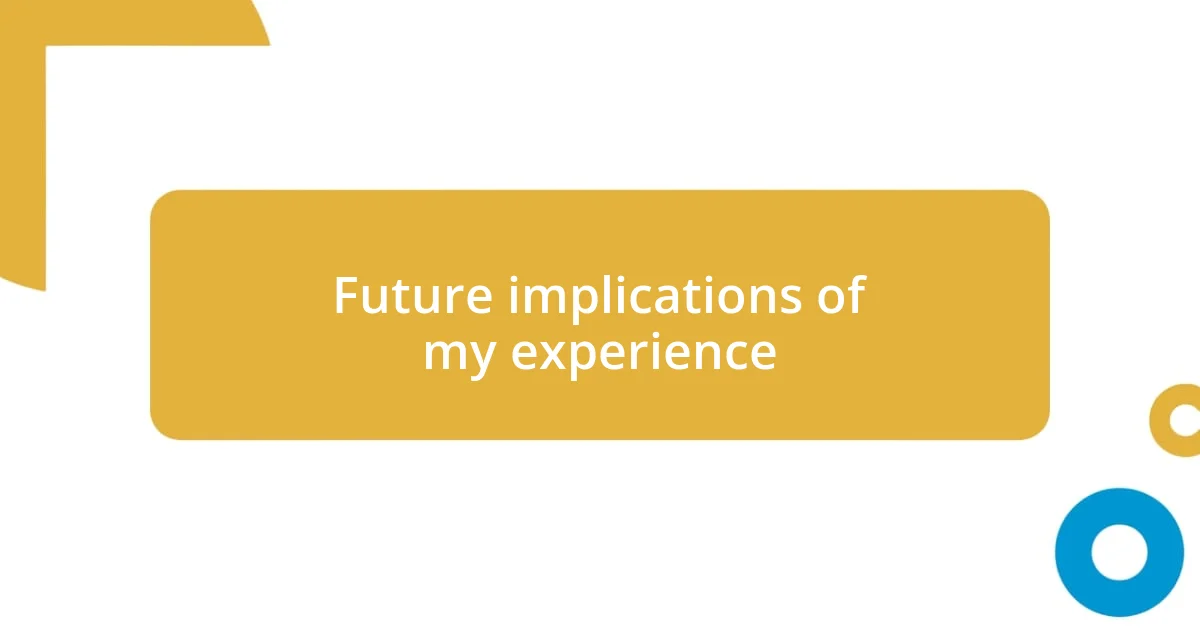
Future implications of my experience
Transitioning to new technologies has left me reflecting on the bigger picture. One implication I’ve noticed is how adaptability becomes a core competency in our professional lives. When I first adopted a cloud-based project management tool, I felt a mix of excitement and dread. It taught me that being flexible and willing to explore can open doors I hadn’t even considered before. Have you ever realized that the skills we gain in navigating new tools often apply to other, seemingly unrelated areas? It’s a powerful reminder that each experience contributes to our overall growth.
Moreover, this shift has shown me the importance of continuous learning. I remember signing up for online courses related to the software we switched to. What started as an obligation became a newfound passion for understanding emerging technologies. Now, I regularly seek out workshops and seminars, realizing that staying updated not only informs my work but also inspires those around me. Isn’t it intriguing how a little curiosity can turn into a lifelong pursuit of knowledge?
Lastly, the experience has cemented my belief in the value of networking. After my tech switch, I connected with others who had faced similar challenges on platforms like LinkedIn. Sharing stories and strategies has not only expanded my professional circle but has enriched my problem-solving toolkit. Have you considered how these connections might offer unexpected insights into your own work? It’s fascinating how our experiences can intersect with others’ journeys, offering us perspectives we never knew we needed.





